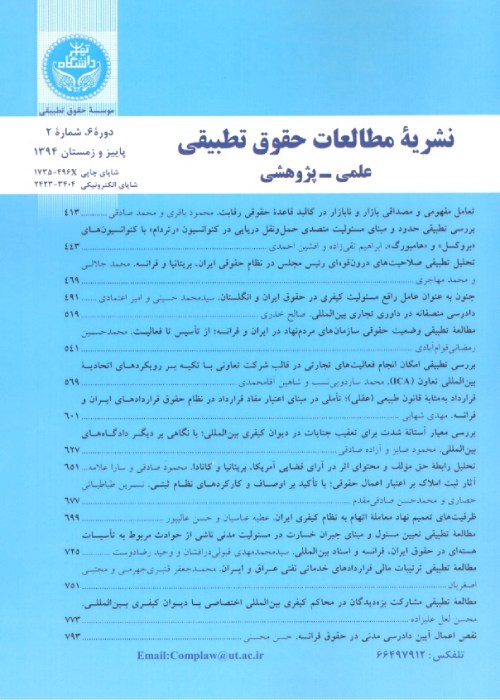A Comparative Study of Protection of Privately Owned Historic Buildings in the England and Iran Legal System; From Permission to Objection
In the UK, the immovable cultural heritage is divided into 5 categories: listed buildings, scheduled monuments, registered battlefields, registered parks & gardens, protected wreck sites. Iranian regulatory system despite the identification of the system of cataloging and division of cultural heritage into movable and immovable heritage, has not initiated cataloging immovable heritage. System of immovable heritage classification, not only specialized English heritage protection but also this act caused the establishment of numerous governmental and non-governmental public institutions and NGOs in the subject of cultural heritage protection. Moreover in the UK, the Historical England Institution which is a non-governmental public institution, publishes documents entitled "Protection Principles, Policies and Guidelines" that these principles have a high place in administrative procedures and must be observed by all Regulatory and decision-making institutions in the field of protection of the historical environment and also all relevant and interested individuals in the field of cultural heritage. Protective statutes of historical buildings restrict the ownership of owners of these buildings. This article studies the legal system of protection of immovable cultural heritages in light of licensing in a comparative study of England, as a model, and Iran. It should be noted that English system of protection, which is constantly modified, has many guiding principles and documents, beside its effective administrative system. These principles have a higher position rather than positive statutes. This article tries to answer to this question: 1. what are the main effects of process of licensing on ownership right of owners? To answer this question, these questions should be answered: what is the importance process of licensing? Which authority is responsible for it? Which principles guilds it? How it can be protested and according to which principles? This article tries to answer to these questions in a comparative study of England, as a model, and Iran in a descriptive-analytical way. Legal system of protection of cultural heritages in England, by distinguishing between different kinds of immovable cultural heritages, regarded historical buildings as an example of immovable cultural heritages and has established a specific system to protect them. Empowerment of local authorities to decide on permissions, from one side, and recognition of protest to these decisions through reconsideration of case by central government in framework of administrative proceedings, from other side, are main characteristics of English model of protection of cultural heritages. But, In Iran, lack of detailed categorizing of cultural heritages has led to Non-specialized system of protection. Actually, Iranian laws have used the phrases of “monuments, buildings, places and immovable properties”, which are too general. Some of advantages of English system of protection are “Decentralization” of licensing process, well ordered process of protest, specialized and valid reconsideration of decisions, and the importance of assessment of interests and principle of proportionality in balancing of interests of owners and cultural heritages. These characteristics have made this system of protection more efficient and defensible rather than Iranian one.
- حق عضویت دریافتی صرف حمایت از نشریات عضو و نگهداری، تکمیل و توسعه مگیران میشود.
- پرداخت حق اشتراک و دانلود مقالات اجازه بازنشر آن در سایر رسانههای چاپی و دیجیتال را به کاربر نمیدهد.




